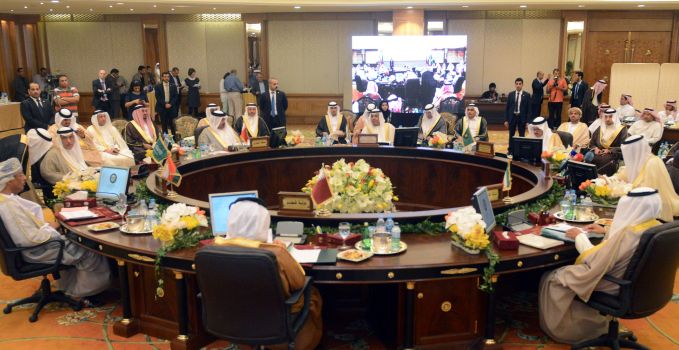First, I’m not sure that the Gulf Cooperation Council (GCC) charter provides explicit guidelines on the political unification of member states. However, it seems to me that the GCC was born out of the idea of cooperation, not solidarity. The fact that the term “cooperation” is in the organization’s name implies that each member is supposed to remain somewhat independent.
Cooperation, by its very definition, is non-binding and takes place only when each participant has clear and vested interests. In other words, cooperation occurs only when mutual interests are served. As such, decisions must be adopted unanimously by all GCC members. Even issues that are thought of as minor or peripheral, such as abolishing entry visas for GGC citizens or substituting national identity cards for passports, require consensus among all six member states.
Second, although the GCC was established over three decades ago it has failed to see substantial achievements during this period, which Gulf leaders themselves acknowledge, particularly because the organization’s decision-making mechanism is hindered by reliance on unanimity. The veto can be used to banish any issue or resolution to the history books. The proposal for a common Gulf currency, which ended with half of the member states approving and the other half opposing, is a prime example of this. Even the GCC Security Pact oscillated between approval and rejection for many years. When the idea of formally developing the GCC into a Gulf Union was raised, Oman frankly and openly announced its rejection of this idea without hesitation.
Third, political unity often necessitates geographical unity. This issue is not currently on the GCC’s agenda, as it would require a complete restructuring of the organization. Even European unity, which is at its strongest level ever, has struggled with this. The European Union has run into trouble when it comes to defining an economic and commercial framework, establishing a core curriculum for higher education, grappling with human rights issues, determining the powers of the European Parliament, and opening national borders. Political positions remain independent and sometimes even divergent, as in the case of the Iraq war, which was endorsed by Britain but opposed by France.
In short, there is no real model on how to unite states politically so long as they remain independent entities and are not integrally linked to a larger entity, within the limits of what is required by these states’ interests, visions and philosophies.
Fourth, there are a number of prerequisites to achieving political unity, most importantly establishing a true economic union characterized by openness and freedom of movement without restrictions. As capital moves freely and at will, procedures, regulations, dispute resolution mechanisms and punitive measures must be in sync. Prerequisites for economic unity include the unification of major objectives, the homogenization of different economic systems, solving the problems of unemployment, and reducing the influx of foreign workers. The same principles can be applied to healthcare, education and critical infrastructure.
To be completely honest and transparent, we must not put the cart before the horse with the GCC. But this will never be successfully realized without a cart full of economic, regulatory, educational and even cultural successes.
Fifth, although each Gulf state supports a common political position on the GCC, this cannot be tied to specific issues or situations. It would not be wise to use specific views or issues to spur the Gulf states towards union. This should not be a means to an end, but an end in itself.
The counterpoint to this article can be read here.
